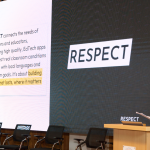August 11, 2021
In this interview we learn about Korean EdTech company Visang Education, their challenges, position in the market and what makes their product stand out from the competition

Please can you introduce yourself and what inspired you to launch Korean EdTech firm Visang Education
I am Wookun Hur, the Director of Global Strategy and Business in Visang Education, Inc. Visang originally started as a publisher over 20 years ago and remains one of the major education publishers, including government textbooks, listed in KOSPI, which is only a few among major players. In late 2000, we started to put allocate more resources to find a better way to blend digital into off-line learning, to increase efficiency for both teachers and students, as we believe it’s the direction we’re headed as a leading content developer.
Testament to our long history of working with teachers and dedicated in-house tech research, we find ourselves engaging directly with customers and we are more digitally focused, as a content and service provider in the recent market grid. In late 2000, we created more comprehensive digital learning kits that enable a fully interactive solution for both teachers and students and now work across sectors and regions from in and out of the boundary of Korea. Now we are actively reaching out to Singapore and neighbouring countries in Southeast Asia, hoping to extend further our partnership to transform classrooms into a future learning environment.
The Covid-19 pandemic has boosted all of us even further by breaking down some of the barriers of bringing in more edtech in the education scene. Visang is certain to respond to these needs in various forms for educators, administrators, and parents by presenting a better way, such as a hybrid class solution by ‘AllviA’ platform, to stay engaged with learners and be accountable for what we do in terms of teaching and learning.
What underpins a Korean educational philosophy and why do you think this is in demand in Singapore and other regions?
For a long time, Korea has been well known for its excessive competition in university entrance exams and high expenditure level in private education. The Korean government is striving to become a medium that covers overall education through its national educational course and textbooks. This momentum started after the surprisingly high economic growth after the Korean War in the 1950s. Currently, with the focus on cultural and individual growth, there are various methods used in the education field with the combination of content, technology, and group projects inside and outside of the classroom.
What are the greatest challenges you have faced in establishing your company both domestically and internationally?
Domestically, Visang has continuously increased its volume with great success. However, in the global market, we have faced challenges when promoting English digital content made by a Korean EdTech company, along with our lack of references in the domestic public market’s education technology (edtech) field. For the latter, we surmise that Korean public education’s rather conservative policy in absorbing edtech products is a significant factor. Therefore, Visang is now actively searching for a long-term partner with whom we can resolve major issues arising from the specific country that Visang would like to penetrate and subsequently, develop a digital product aligned with the specific curriculum. With that in mind, Visang regards Singapore’s market as one with a high demand in edtech products and is eagerly searching for partners.
RECOMMENDED: https://global-edtech.com/category/community/
Do you think the online learning market will continue to grow in the coming years and why?
Due to the COVID-19 pandemic, many schools and institutions are closed and have converted to online and remote learning. Although there are online education companies that facilitate online learning, Visang’s content is unique by providing content and a strong tool to inspire students’ participation in class. Through digital pads or mobile phones, students will submit in-class activity results to teachers.
Additionally, Visang also provides a “remote learning environment”, such that both students and teachers need not be at the same location for learning to take place. Visang provides diverse services that are suitable for schools or institutions to take learning online. Even when the pandemic subsides, there is still an ongoing concern regarding how education will adapt to different situations such as future pandemics or crises. Visang education’s digital content is initially built for “Classroom based environment”, that is, digital content accessed through a touch screen and digital pads in the classroom.
However, we expect the demand for online and remote learning to grow significantly, and students’ digital literacy will increase simultaneously. We predict that global infrastructure for digital education, both in public and private sectors, will become more stabilized and the demand for online and remote learning will increase. Following this trend, the competition in this field will undoubtedly become fiercer, so quality digital content like that of Visang’s should lead the competition.
What are some of the unique features of your EdTech product range?
Visang’s hero platform, AllviA, produces original and interactive solutions that utilise smart boards and pads. This digitised educational platform can be used for any subject using any devices. Educators are even able to customize learning experiences for their students by digitising content and developing it as a program on AllviA. Visang is also open to expanding our portfolio through cooperation with other content-providing companies.
Adapting to the Covid-19 pandemic, we have also developed remote learning products where teachers and students can access their classes from their homes. With the remote learning products, they can access the class with ease and the learning results are sent to the Learning Management System (LMS). Visang minimizes the risks of teaching in a face-to-face setting and empowers teachers to utilize digital content without any limitations, so that the learning path of students would not be disrupted.
With students incorporating digital pads, computers or cell phones in their lessons, the teacher can continuously check the students’ level of understanding by sending tasks. Consequently, the students’ interaction with the device, such as touch, voice recording or writing, is saved to the LMS for individual students’ learning path assessment.
New to EdTech? Start here: https://global-edtech.com/edtech-definitions-products-and-trends/








